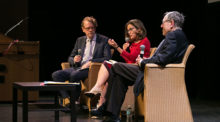Daviel Lazure-Vieira
It was once one of the richest nations in Latin America, and it is now one of the poorest. Economic collapse, protests brutally shut down by the government, electoral irregularities, rising inequalities: Venezuela is, by any measure, in crisis. In a country highly polarized between supporters and critics of President Nicolás Maduro, responding adequately to the challenges facing Venezuela seems particularly difficult.
On October 26th, Hon. Chrystia Freeland, Canada’s minister of foreign affairs, hosted the third meeting of the Lima Group in Toronto, bringing together foreign ministers from 12 countries across the Americas to seek a solution to the Venezuelan crisis. During the meeting, they agreed to take measures to increase cooperation at international level and translate their support to the Venezuelan people into concrete actions. Later that day, the University of Toronto’s Munk School of Global Affairs and the Canadian Council for the Americas hosted a panel discussion with government leaders and experts to discuss the current state of affairs as well as ways forward.
Two panels were organized to address the political and economic crisis in Venezuela. The first panel featured Freeland, Irwin Cotler, former minister of justice and attorney general of Canada, and Lucan Ahmad Way, professor of political science at the University of Toronto. They reviewed some of the actions already taken by the Canadian government and highlighted the key points of the Lima Group’s agenda, including the importance of economic sanctions and the need to attend to the ongoing humanitarian crisis in Venezuela. “We must help people, including those who have taken such risks by standing up for their rights,” said Freeland. “They need to know that they’re not alone and that we see them. We firmly believe that a political solution is possible and essential, but it must be found by the people of Venezuela.” Cotler agreed: “Against democratic recession, civil society needs to be mobilized. That’s why it is crucial to create an international coalition with the constituencies of democracies around the world, buttressed by strong grassroots movements.”
The second panel, moderated by Jonathan Hausman, chair of the board of the Canadian Council of the Americas, featured Way as well as Luisa Ortega, former Venezuelan attorney general, Jennifer McCoy, distinguished university professor of political science at Georgia State University, and Gary Clyde Hufbauer, senior fellow at the Peterson Institute for International Economics.
Ortega remained optimistic: “I truly believe we’ll recover freedom and democracy. That’s what Venezuelans deserve – a government that respects their rights and their dignity and will enable them to develop their own capabilities. The priority today is to work through humanitarian channels to overcome the major obstacles Venezuelans are facing in the immediate.” For Hufbauer, the international community must be proactive in its efforts to deal with the crisis: “We must work together and prepare ourselves to provide the very substantial resources that are needed now and will be needed in the future, because this is a country that’s broken in every possible respect.”
“Venezuela does have a long history of democracy,” said Way. “It’s very different from other authoritarian regimes because there really is a democratic tradition to fall back on, which is important to remember in these dark times.” McCoy concurred: “Political change comes in waves – two steps forward, a couple of steps back. But sometimes, unexpected events can be a catalyst for change. The democratic experience in the history of Venezuela is significant. I think the current situation shows us that political opposition needs to open up further opportunities for people to come together, so that new strategies and visions can emerge to shape the future.”
November 2, 2017
